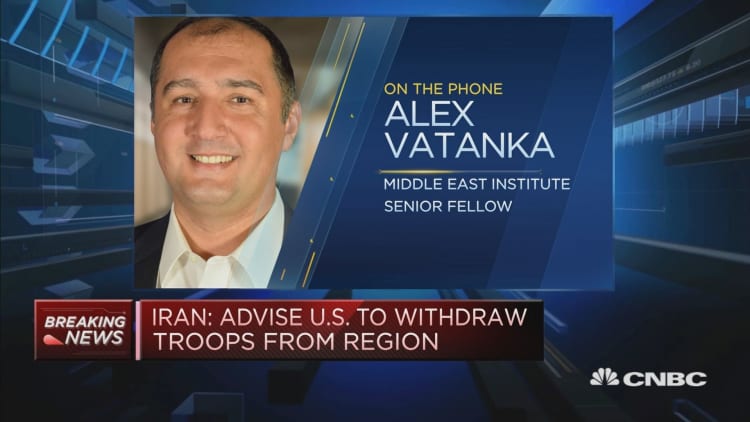
Tehran's retaliation against the U.S. killing of Iranian top commander Qasem Soleimani has come "too fast and too furious," and there's now a "real danger" the situation could get out of hand, an expert on Middle East security affairs said Wednesday.
"But look, Iran has made its point ... in many ways, we were expecting an Iranian retaliation. I, for one, did not think it will come so fast and so furious but that's what happened," said Alex Vatanka, senior fellow at the Middle East Institute, told CNBC's "Squawk Box Asia."
Iran fired more than a dozen ballistic missiles against multiple Iraqi bases housing U.S. troops in Iraq early morning Wednesday local time, according to a statement by the U.S. Department of Defense. The Pentagon added that it's "working on initial battle damage assessments."
The strike came less than a week after a U.S. airstrike — authorized by President Donald Trump — killed Soleimani, who led the Iranian Quds Force — the foreign operations wing of the elite paramilitary Islamic Revolutionary Guards Corps.

"There is a real danger this is going to get out of hand," Vatanka said.
"It's too early to say what the U.S. reaction likely will be," he said, adding that the number of casualties will be "a big factor" that determines America's next move.
The expert explained that the move by Tehran showed that authorities "decided to lash out to let Trump know that they can also hurt him" and not be cornered by the president's so-called maximum pressure campaign to rein in Iran's pursuit of nuclear infrastructure and regional aggression.
"The big question is what will President Trump do? Because so much of this is about his reelection, he's going to have to make a decision fast whether a war with Iran and all the chaos that come with it in the Middle East is going to help him or help him be defeated in the November election coming up," said Vatanka.
The U.S. president responded in a tweet hours after the attack, "All is well! Missiles launched from Iran at two military bases located in Iraq. He said the U.S. was assessing casualties and damages. "So far, so good! We have the most powerful and well equipped military anywhere in the world, by far! I will be making a statement tomorrow morning."
Trump had earlier threatened to hit 52 targets, including cultural sites, in Iran "very hard" the country retaliates for the killing of Soleimani — a pledge that Pentagon's Joint Chiefs of Staff Chairman Gen. Mark Milley appeared to deny.


